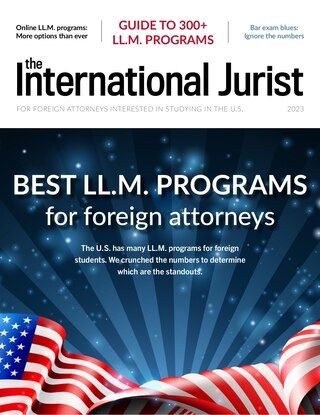Many students come to the U.S. and think that pursuing the LL.M. degree and becoming admitted to a state bar is all they need to do for the rest to fall into place. This is wrong.
Completing the LL.M. degree and bar admission are, indeed, two important elements but only pieces of a much bigger picture — a picture whose vastness only few truly grasp. The LL.M. and bar exam are part of our formal education. But what it really takes to make the most of the LL.M. education, whether you want to return to your home country or stay in the U.S., is informal education. Informal and formal education are at the crossroads between success and failure.
If you have already graduated from your LL.M. program, you may be familiar with the abyss opening up after receiving the degree. You spent months and months in the library and now that you hold the degree in your hands, a hurricane looms on the horizon. The OPT period and its countdown has started — tick tock — no job, no internship — tick tock — no network, no opportunities — tick tock — tick tock…. What on earth happened? Didn’t you do exactly what you were told to do?
And that is the problem. If we do only what we are told to do, we will go where everyone else is going. We need to do more. I don’t blame anyone for missing this point. When we start our LL.M., we attend lectures on resume and cover letter writing, and on professional development and networking. The career services office may hand us a list of employers who have hired LL.M.s in the past. Our law school may be part of the ISIP program — a job fair organized just for us. With all this spoon-feeding, we understandably may be under the impression that we receive the whole package to success. Again, this impression is mistaken.
What we really receive are tools, tools that we should use to self-educate — nothing more, nothing less. Whether and how we use these tools to educate ourselves is entirely up to us. LL.M. students need to be autodidacts and self-educate way beyond the formal legal education, and this requires self-discipline and reflective capabilities. Never before has it been so easy to self-educate. According to Google, 129,864,880 different books have been published on Earth — not to mention the wealth of information on the Internet. The time when our parents read to us is long gone; we now have to select materials and read ourselves. And reading is only the beginning of education — we need to absorb, analyze, and use the knowledge we obtain. It’s a commitment to the continued development of our professional persona, beyond any formal education.
But you don’t have time for that, you say? I am sorry, but this is an excuse. “I don’t have the time” means nothing other than “I am not willing to do it” or “other things are more important to me.” Ask yourself this question: “Am I willing to close my Facebook account and spend the time wasted on following my friends’ lunch habits to work for my professional success?”
But you don’t know what you should be learning in the first place? If you don’t know what you have to learn, you have already learned one thing: That you are in great need of education precisely because you don’t know what you don’t know. We are never done educating ourselves. If we think there is nothing left for us to learn and that the fruits of our labors are ripe for us to pick, we have lost the opportunity to become the professional we have the capacity to become.
Desiree Jaeger-Fine is principal of Jaeger-Fine Consulting, LLC, a career management firm for international attorneys in New York, and author of the forthcoming “A Short & Happy Guide to Networking” (West Academic Publishing).





